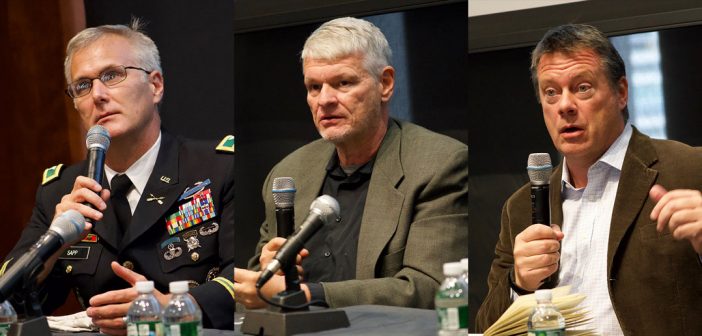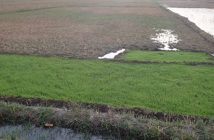At a Fordham panel, a retired Central Intelligence Agency officer, a U.S. Army Special Forces officer, and an award-winning journalist shared behind-the-scenes stories from the CIA’s first post-9/11 mission to locate Al Qaeda and prevent another terrorist attack in the U.S. The panel, hosted by Fordham’s military science department at the Lincoln Center campus on Nov. 4, is part of the University and its ROTC program’s 20th anniversary commemoration of 9/11 and its legacy.
“The team is modest about this, but it’s hard to overstate the dangers they faced,” said Toby Harnden, a panelist who wrote a book on the mission. “They were a tiny group of Americans working deep in enemy territory in a very ambiguous situation.”
Each of the panelists has a special connection to the mission. Justin Sapp, now military chief of staff to the U.S. ambassador to the United Nations, was a Green Beret captain who was assigned to the team. David Tyson, a Central Asian sociologist who became a Central Asian expert for the CIA, was the team’s linguist. Harnden, a former foreign correspondent who has reported from 33 countries, wrote First Casualty: The Untold Story of the CIA Mission to Avenge 9/11 (Little, Brown and Company, 2021), which chronicles their infiltration into Taliban-controlled territory.
Sapp and Tyson were among eight members of Team Alpha. In some contexts, they resembled a group of dads going on a fishing trip, said Harnden, showing the audience a 2001 photo of the team standing together. But their cross-section of abilities and backgrounds made them invaluable, he said.
The team prepared for their mission with a light packing list, including night vision equipment, Soviet chest racks, and first aid pouches, said Sapp. As they approached the Afghanistan border on two U.S. Special Operations helicopters, said Sapp, he could see the lights in Uzbekistan and the moon reflecting off the Amu-Darya River. But the world beyond was nearly pitch black.
“It was dark, except for little fires here and there. That was something stark that I’ll never forget,” Sapp said.
After they landed in Afghanistan, there were moments of levity. The team met their new partners: ethnic Uzbek calvarymen who were fighting the Taliban and Al Qaeda. Tyson said that when they shook hands for the first time, the Uzbeks marveled at his “soft hands,” a stark difference from their calloused palms.
The Americans joined the Uzbek men on horseback. Their journey included 10-hour rides across mountains, with only one or two breaks, said Tyson. This was a challenge for Tyson, who had only ridden ponies at a fair. He and his teammates often fell off their horses, while the Uzbek soldiers smiled, he said.
“Here we are coming to save the world, so to speak, and we can’t even ride a horse,” Tyson said.
But for the most part, said Tyson, the atmosphere was serious and stoic—and sometimes deadly.
In Nov. 2001, Team Alpha lost fellow CIA officer Mike Spann, the first American casualty in Afghanistan. Tyson and Spann had been gathering intel from a group of Al Qaeda prisoners—one of America’s first opportunities to extract information from men trained by Osama bin Laden, the mastermind behind 9/11—until gunfire erupted. A few prisoners had hid weapons and started an uprising. Spann was killed; Tyson managed to escape.
“I was on autopilot mode. I went to a place I’ve never been to before and never been to since, mentally,” said Tyson, who received the Distinguished Intelligence Cross—the CIA’s highest award for valor—for his work on the mission. “There was no courage or bravery.”
Spann is a hero, said Tyson, as are their partners in Afghanistan. Their team bonded with many people, including a commander named Abdul Rashid Dostum, and others who were killed.
At the end of the panel, the three men reflected on how their time in Afghanistan had reshaped their view on what it means to serve their country. Sapp said that he learned to stay vigilant and learn as much as he can about the world. “As military officers, you never know where foreign policy will take you,” he said. Tyson said that good people across the world are caught in bad systems, politically and economically, that destroy them as individuals. But most Americans don’t know what that’s like.
“I wish we Americans could transport ourselves, mentally, and see what the rest of the world experiences,” Tyson said. “At home, we’re fighting each other for all kinds of odd reasons. But we have something worth preserving and protecting in this country.”



